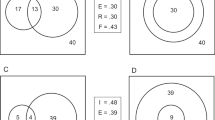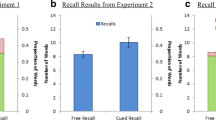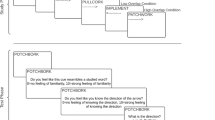Summary
An experiment was conducted to determine whether the processes underlying memory for enacted and nonenacted events are the same or different. The experimental paradigm used was that of recognition failure of recallable information. At study subjects were given verbal commands (e.g., break the match, roll the ball), that they were to remember or enact and remember. At test subjects were first asked to recognize the noun in each command in the absence of the verb and then to recall the noun with the verb present as cue. Half the subjects were given the two tests in the reverse order. The results demonstrate that enactment and nonenactment differ with respect to the degree of dependence/independence between recognition and recall. In the enactment condition recognition and cued recall are completely independent and in the nonenactment condition they are almost completely dependent.
Similar content being viewed by others
References
Andersson, J. R., & Bower, G. H. (1972). Recognition and retrieval processes in free recall. Psychological Review, 79, 97–123.
Bäckman, L. (1985). Further evidence for the lack of adult age differences on free recall of subject performed tasks: The importance of motor action. Human Learning, 4, 79–87.
Bäckman, L., & Nilsson, L.-G. (1984). Aging effects in free recall: An exception to the rule. Human Learning, 3, 53–69.
Bäckman, L., & Nilsson, L.-G. (1985). Prerequisites for the lack of age differences in memory performance. Experimental Aging Research, 11, 67–73.
Cohen, R. L. (1981). On the generality of some memory laws. Scandinavian Journal of Psychology, 22, 267–281.
Cohen, R. L. (1985). On the generality of the laws of memory. In L.-G. Nilsson and T. Archer (Eds.), Perspectives on learning and memory. pp. 247–277. Hillsdale, NJ: Erlbaum.
Cohen, R. L., & Bean, G. (1983). Memory in educable mentally retarded adults: Deficit in subject or experimenter. Intelligence, 7, 287–298.
Cohen, R. L., & Stewart, M. (1982). How to avoid developmental effects in free recall. Scandinavian Journal of Psychology, 23, 9–16.
Craik, F. I. M., & Tulving, E. (1975). Depth of processing and the retention of words in episodic memory. Journal of Experimental Psychology: General, 104, 268–294.
Engelkamp, J., & Krumnacker, H. (1980). Image and motor processes in the retention of verbal materials. Zeitschrift für Experimentelle und Angewandte Psychologie, 27, 511–533.
Flexser, A. J. (1981). Homogenizing the 2 × 2 contingency table: A method for removing dependencies due to subject and item differences. Psychological Review, 88, 327–339.
Flexser, A. J., & Tulving, E. (1978). Retrieval independence in recognition and recall. Psychological Review, 85, 153–171.
Murdock, B. B., Jr. (1974). Human memory: Theory and data. Potomac, Maryland: Erlbaum.
Neely, J. H., & Payne, D. G. (1983). A direct comparison of recognition failure rates for recallable names in episodic and semantic memory tests. Memory & Cognition, 11, 161–171.
Nilsson, L.-G., & Bäckman, L. (1989). Implicit memory and the enactment of verbal instructions. In S. Lewandowsky, J. Dunn, & K. Kirsner (Eds.), Implicit memory: theoretical issues. Hillsdale, NJ: Erlbaum.
Nilsson, L.-G., & Cohen, R. L. (1988). Enrichment and generation in the recall of enacted and nonenacted instructions. In M. M. Gruneberg, P. E. Morris, & R. N. Sykes (Eds.), Practical aspects of memory: Current research and issues, Vol. 1, pp. 425–432. New York: Wiley.
Nilsson, L.-G., & Craik, F. I. M. (1989). Effects of aging, encoding, and retrieval manipulations on memory for subject performed tasks. European Journal of Cognitive Psychology, 1, in press.
Nilsson, L. G., Dinniwell, M., & Tulving, E. (1987). Recognition failure of categorized words. Memory & Cognition, 15, 389–396.
Nilsson, L.-G., & Gardiner, J. (in preparation). The law of independence in recognition and recall.
Nilsson, L.-G., Law, J., & Tulving, E. (1988). Recognition failure of unique names: Evidence for an empirical law of memory and learning. Journal of Experimental Psychology: Learning, Memory, and Cognition, 14, 266–277.
Nilsson, L.-G., & Shaps, L. P. (1980). A functional view of memory. In F. Klix and J. Hoffmann (Eds.), Cognition and memory: Interdisciplinary research of human memory activities. Berlin: DVW.
Nilsson, L.-G., & Shaps, L. P. (1981). A reconstructive-processing interpretation of the recognition failure phenomenon. Acta Psychologica, 47, 25–37.
Rabinowitz, J. C. (1984). Aging and recognition failure. Journal of Gerontology, 39, 65–71.
Salz, E., & Donnenwerth-Nolan, S. (1981). Does motoric imagery facilitate memory for sentences? A selective interference test. Journal of Verbal Learning and Verbal Behavior, 20, 322–332.
Sandberg, K. W. (submitted). Integration and cue overlap in recognition failure: An empirical study. Scandinavian Journal of Psychology.
Shaps, L. P., & Nilsson, L.-G. (1980). Encoding and retrieval operations in relation to age. Developmental Psychology, 16, 636–643.
Slamecka, N. J., & Graf, P. (1978). The generation effect: Delineation of a phenomenon. Journal of Experimental Psychology: Human Learning and Memory, 4, 592–604.
Tulving, E. (1983). Elements of episodic memory. New York: Oxford University Press.
Tulving, E., & Wiseman, S. (1975). Relation between recognition and recognition failure of recallable words. Bulletin of the Psychonomic Society, 6, 79–82.
Watkins, M., & Gardiner, J. M. (1979). An appreciation of the generate-recognize theory of recall. Journal of Verbal Learning and Verbal Behavior, 18, 687–704.
Watkins, M., & Tulving, E. (1976). Episodic memory: When recognition fails. Journal of Experimental Psychology: General, 104, 5–29.
Wiseman, S., & Tulving, E. (1976). Encoding specificity: Relation between recall superiority and recognition failure. Journal of Experimental Psychology: Human Learning and Memory, 2, 349–361.
Author information
Authors and Affiliations
Rights and permissions
About this article
Cite this article
Svensson, T., Nilsson, LG. The relationship between recognition and cued recall in memory of enacted and nonenacted information. Psychol. Res 51, 194–200 (1989). https://doi.org/10.1007/BF00309148
Issue Date:
DOI: https://doi.org/10.1007/BF00309148




